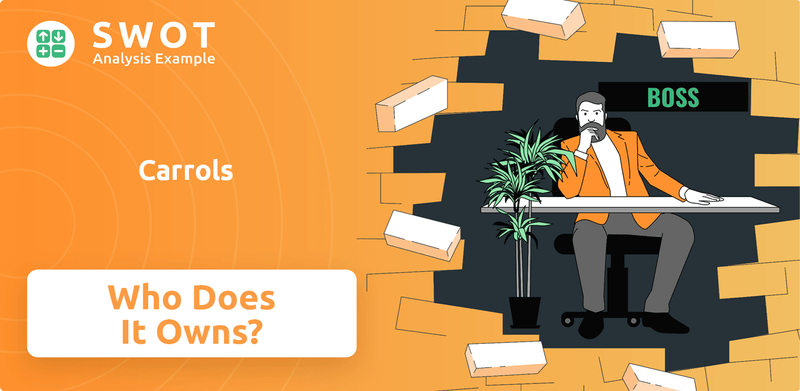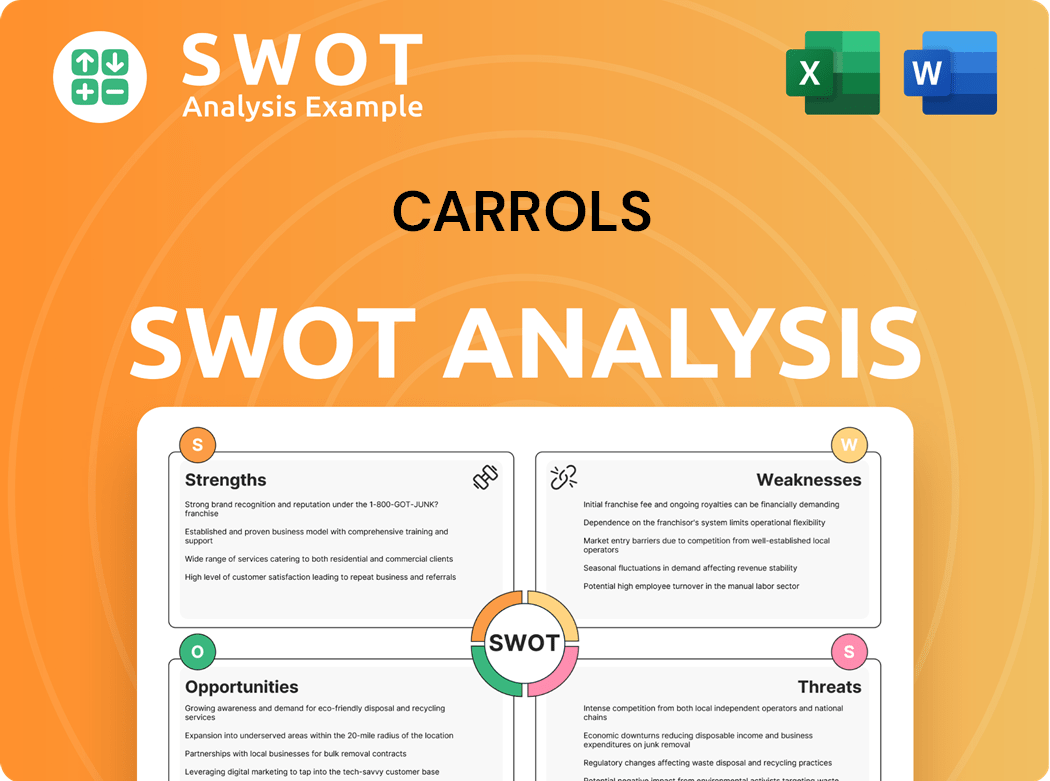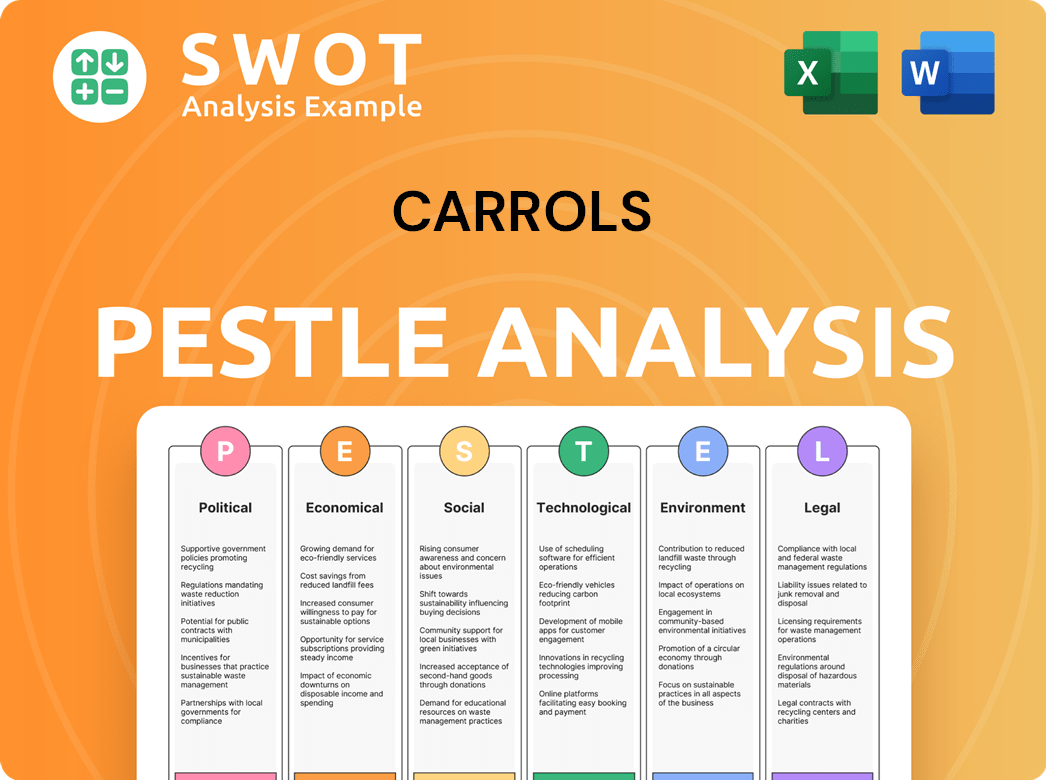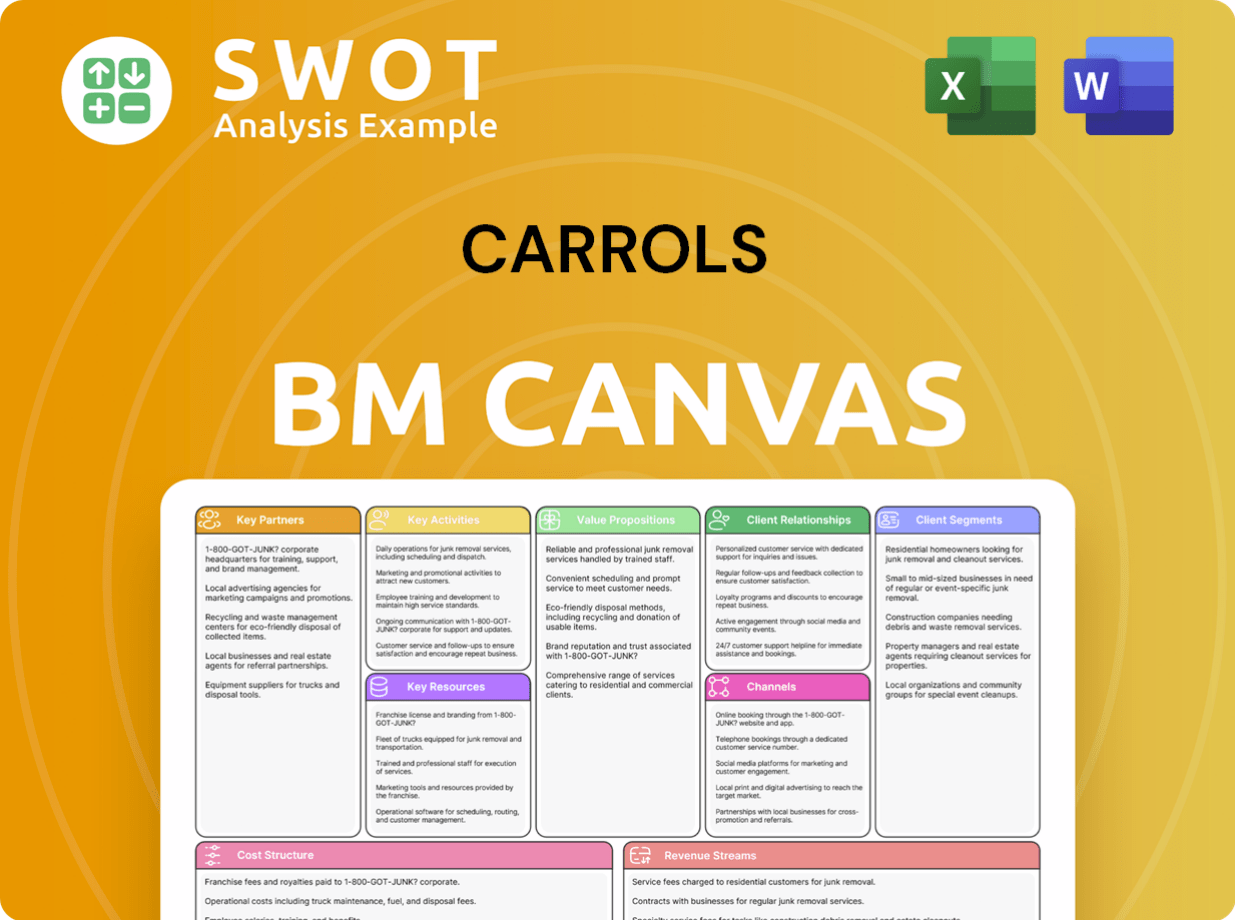Carrols Bundle
Who Really Owns Carrols Company Now?
Understanding a company's ownership is crucial for investors and business strategists alike. The recent acquisition of Carrols Restaurant Group, the largest Burger King franchisee, presents a compelling case study in corporate ownership dynamics. This analysis delves into the significant shift in Carrols SWOT Analysis, exploring its journey from a small regional chain to a major player in the fast-food industry and the impact of its new ownership.

The story of Carrols Company ownership is a tale of strategic evolution, from its founding in 1960 to its current status. This exploration will uncover the Carrols SWOT Analysis, including the key players, the implications for Carrols stock, and the future direction under its new parent company. Discover who the Carrols Restaurant Group owner is now and what this means for its operations and financial performance.
Who Founded Carrols?
The story of Carrols Restaurant Group, and who owns Carrols, began in 1960. It started as 'Carrols Systems,' a division of a Midwestern firm. Herbert N. Slotnick played a key role, securing the exclusive rights to the Carrols license for New York State.
The original Carrols hamburger chain was named after Carol Maranz, the daughter of Tastee-Freez co-owner Leo S. Maranz. Slotnick launched the first restaurants in the Syracuse, New York, area during the early 1960s. The company grew, eventually operating 120 Carrols restaurants at its peak in the late 1960s.
A significant turning point arrived in 1975. Carrols entered into a franchise agreement with Burger King Corporation. This led to the conversion of many Carrols restaurants into Burger King locations over a five-year period. This strategic shift was a pivotal moment in the company's history.
Carrols emerged from 'Carrols Systems' in 1960.
Herbert N. Slotnick secured the Carrols license for New York.
The chain was named after Carol Maranz.
Restaurants opened in the Syracuse area in the early 1960s.
The company operated 120 restaurants at its peak.
A franchise deal with Burger King began in 1975.
The 1975 agreement with Burger King was a major strategic move. While specific details about the early equity distribution are not publicly available, this agreement marked a significant shift. Carrols also owned other restaurant chains like Pollo Tropical and Taco Cabana. However, these were later divested in 2011 and 2012. This allowed the company to focus on its core Burger King operations. For more insights into the competitive landscape, you can explore the Competitors Landscape of Carrols.
Carrols SWOT Analysis
- Complete SWOT Breakdown
- Fully Customizable
- Editable in Excel & Word
- Professional Formatting
- Investor-Ready Format

How Has Carrols’s Ownership Changed Over Time?
The ownership of Carrols Restaurant Group, the largest Burger King franchisee in the U.S., has seen significant shifts over time. Initially, the company grew as a franchisee after converting many of its original restaurants to Burger King locations in 1975. A major change occurred in 2012 when Burger King Corporation (BKC), later part of Restaurant Brands International (RBI), invested in Carrols, acquiring preferred stock convertible to roughly 15.2% of Carrols' common stock. This investment gave BKC/RBI the right to appoint two board members.
Another key development was the April 2019 merger with New CFH, a subsidiary of Cambridge Franchise Holdings, LLC. This $238 million transaction added numerous Burger King and Popeyes restaurants to Carrols' portfolio. Cambridge received approximately 7.36 million common shares, resulting in an approximate 24% equity interest on a fully-diluted basis. Alex Sloane and Matt Perelman from Cambridge joined the Carrols Board of Directors. Before the full acquisition, major institutional shareholders included Norges Bank and JPMorgan Chase & Co. The ultimate change came on May 16, 2024, when Restaurant Brands International Inc. (RBI) fully acquired Carrols Restaurant Group, making it a subsidiary.
| Milestone | Date | Details |
|---|---|---|
| BKC Investment | 2012 | Burger King Corporation (later RBI) acquired preferred stock in Carrols. |
| Merger with New CFH | April 2019 | Carrols merged with a subsidiary of Cambridge Franchise Holdings, adding restaurants. |
| RBI Acquisition | May 16, 2024 | RBI acquired all outstanding shares of Carrols, making it a subsidiary. |
The final acquisition by RBI, completed in May 2024 for approximately $1.0 billion at $9.55 per share, consolidated ownership. This means that RBI, the parent company, now fully owns Carrols. This acquisition integrates the largest Burger King franchisee directly into RBI's portfolio. This move simplifies the corporate structure and streamlines operations. As of the acquisition date, Carrols operates as a subsidiary of Restaurant Brands International Inc.
The ownership of Carrols has evolved significantly, culminating in full acquisition by Restaurant Brands International (RBI) in May 2024.
- RBI now fully owns Carrols, the largest Burger King franchisee.
- Prior investments by BKC (later RBI) and a merger with New CFH shaped the ownership structure.
- The acquisition, valued at approximately $1.0 billion, was finalized in May 2024.
- Carrols operates as a subsidiary of RBI.
Carrols PESTLE Analysis
- Covers All 6 PESTLE Categories
- No Research Needed – Save Hours of Work
- Built by Experts, Trusted by Consultants
- Instant Download, Ready to Use
- 100% Editable, Fully Customizable

Who Sits on Carrols’s Board?
Prior to the acquisition by Restaurant Brands International (RBI), the Board of Directors of Carrols Restaurant Group included members representing major shareholders and independent seats. Affiliates of RBI and Burger King Corporation (BKC) held 100% of Carrols' Series D Convertible Preferred Stock, which was convertible into 14.6% of Carrols' outstanding common shares as of March 1, 2024. This preferred stock granted RBI/BKC special rights, including the ability to elect two members to the Carrols board of directors. These affiliates also had approval rights over any merger or engaging in business other than the ownership and operation of Burger King and Popeyes restaurants. The voting structure typically followed a one-share-one-vote principle for common stock.
The Series D Preferred Stock held by BKC Stockholders (affiliates of RBI) provided significant voting power. These preferred shares were entitled to vote on an as-converted basis with the common stock on all matters, and they provided the right to elect directors based on their ownership percentage. For instance, they could elect two board members as long as their ownership was above 11.5% of the total outstanding common stock (on an as-converted basis), and one board member if it was above 7.5%. The merger agreement for RBI's acquisition of Carrols in January 2024 involved a special transaction committee of Carrols' Board of Directors, comprised of independent directors unaffiliated with RBI, to evaluate the proposal. With the completion of the acquisition on May 16, 2024, Carrols is now a subsidiary of RBI, and its board structure and voting power are effectively controlled by RBI.
A lawsuit filed in October 2024 by a pension fund and some shareholders alleged that RBI abused its control to coerce Carrols into the $1 billion acquisition, claiming that RBI, as the franchisor and a major shareholder, limited Carrols' growth prospects. This highlights potential governance controversies and the influence of a major shareholder/franchisor on decision-making within the company. This impacts the question of Carrols Company ownership and who is the current owner of Carrols Restaurant Group.
Before the acquisition, RBI held significant voting power through preferred stock, influencing board composition. The merger agreement involved a special committee, but a lawsuit alleged coercion by RBI. Now a subsidiary of RBI, Carrols' board is effectively controlled by RBI.
- RBI's influence was exerted through preferred stock holdings.
- A lawsuit raised concerns about RBI's influence on the acquisition.
- Carrols is now a subsidiary, with RBI controlling the board.
- The voting structure was primarily based on common stock, but preferred stock held by BKC provided significant power.
Carrols Business Model Canvas
- Complete 9-Block Business Model Canvas
- Effortlessly Communicate Your Business Strategy
- Investor-Ready BMC Format
- 100% Editable and Customizable
- Clear and Structured Layout

What Recent Changes Have Shaped Carrols’s Ownership Landscape?
The most significant recent development in the Carrols Company ownership profile is the full acquisition by Restaurant Brands International Inc. (RBI). Announced on January 16, 2024, and completed on May 16, 2024, RBI acquired all outstanding shares of Carrols not already held by RBI or its affiliates. The transaction was valued at approximately $1.0 billion, with RBI paying $9.55 per share in an all-cash deal. This made Carrols a wholly-owned subsidiary of RBI.
This acquisition is part of Burger King's 'Reclaim the Flame' plan, which aims to boost sales and improve franchisee profitability. As part of this, Burger King plans to invest an additional $500 million to remodel over 600 acquired Carrols restaurants over the next five years. Following these remodels, RBI intends to refranchise most of this portfolio to new or existing smaller franchise operators within seven years. The company will maintain a smaller company-owned restaurant portfolio for strategic purposes. Before the acquisition, institutional investors like Norges Bank and Jpmorgan Chase & Co. held significant shares. However, following the acquisition, Carrols' shares were delisted from NASDAQ.
This move reflects a trend of consolidation in the industry, with franchisors taking more control of their largest franchisees to drive brand-wide initiatives. A lawsuit filed in October 2024 by shareholders alleges that RBI used its existing control to pressure Carrols into the sale at a potentially unfavorable price. This highlights the complexities that can arise when a major franchisor also has a significant ownership stake in a publicly traded franchisee. This acquisition is a definitive shift. Carrols is now fully integrated into RBI's Restaurant Holdings segment, which also includes Popeyes China.
RBI's complete acquisition of Carrols marks a significant shift in Carrols Restaurant Group owner. The delisting from NASDAQ and the integration into RBI's holdings show a consolidation strategy. This is part of a broader trend in the fast-food industry.
The 'Reclaim the Flame' plan includes a $500 million investment for restaurant remodeling. The goal is to improve franchisee profitability and accelerate sales growth. RBI plans to refranchise a majority of the acquired restaurants.
The acquisition was valued at approximately $1.0 billion, with shares sold at $9.55 each. The deal has led to legal challenges. This transaction also has long-term implications for Carrols parent company.
The refranchising of many acquired restaurants could reshape the Carrols stock landscape. The success of the 'Reclaim the Flame' plan will be key. For more details, see Revenue Streams & Business Model of Carrols.
Carrols Porter's Five Forces Analysis
- Covers All 5 Competitive Forces in Detail
- Structured for Consultants, Students, and Founders
- 100% Editable in Microsoft Word & Excel
- Instant Digital Download – Use Immediately
- Compatible with Mac & PC – Fully Unlocked

Related Blogs
- What are Mission Vision & Core Values of Carrols Company?
- What is Competitive Landscape of Carrols Company?
- What is Growth Strategy and Future Prospects of Carrols Company?
- How Does Carrols Company Work?
- What is Sales and Marketing Strategy of Carrols Company?
- What is Brief History of Carrols Company?
- What is Customer Demographics and Target Market of Carrols Company?
Disclaimer
All information, articles, and product details provided on this website are for general informational and educational purposes only. We do not claim any ownership over, nor do we intend to infringe upon, any trademarks, copyrights, logos, brand names, or other intellectual property mentioned or depicted on this site. Such intellectual property remains the property of its respective owners, and any references here are made solely for identification or informational purposes, without implying any affiliation, endorsement, or partnership.
We make no representations or warranties, express or implied, regarding the accuracy, completeness, or suitability of any content or products presented. Nothing on this website should be construed as legal, tax, investment, financial, medical, or other professional advice. In addition, no part of this site—including articles or product references—constitutes a solicitation, recommendation, endorsement, advertisement, or offer to buy or sell any securities, franchises, or other financial instruments, particularly in jurisdictions where such activity would be unlawful.
All content is of a general nature and may not address the specific circumstances of any individual or entity. It is not a substitute for professional advice or services. Any actions you take based on the information provided here are strictly at your own risk. You accept full responsibility for any decisions or outcomes arising from your use of this website and agree to release us from any liability in connection with your use of, or reliance upon, the content or products found herein.